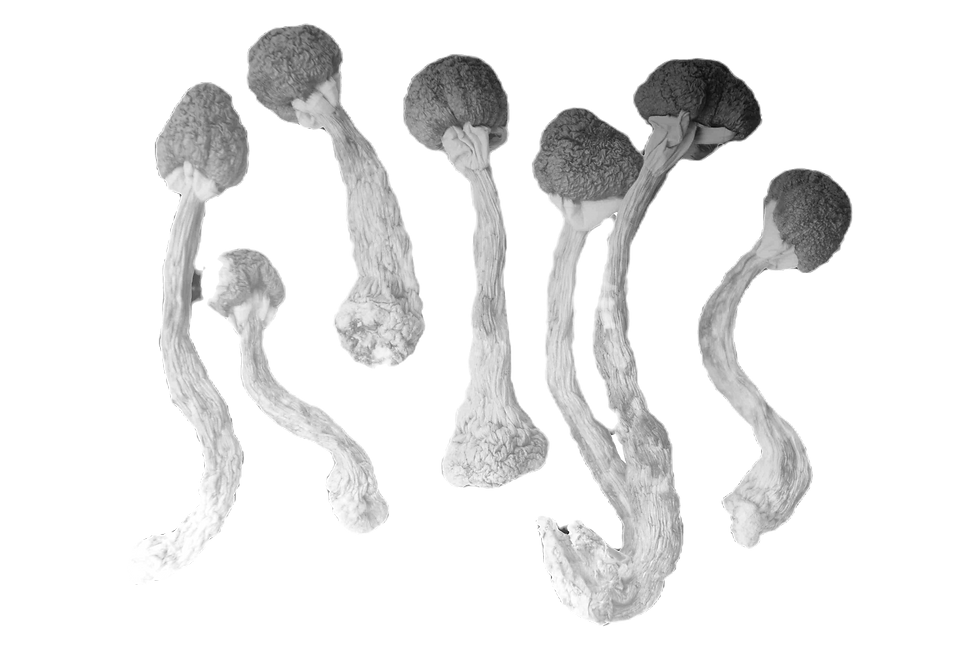People microdose for a variety of reasons, often tied to personal growth, mental health, or creative performance. Some of the most common motivations include:
-
Enhanced Focus & Productivity: Many report improved attention, clarity, and “flow state.”
-
Emotional Balance: Subtle mood elevation and reduced anxiety or depression
-
Creativity & Insight: Heightened creative thinking and problem-solving.
-
Mindfulness & Connection: A greater sense of presence and empathy in daily life.
-
Habit & Mindset Shifts: Support for breaking unhelpful patterns or thought loops.
While research is still emerging, growing anecdotal and clinical evidence supports these potential benefits.


What Is Microdosing?
Microdosing is the practice of consuming very small, sub-perceptual amounts of a psychedelic substance — most commonly psilocybin, the active compound found in certain mushrooms.
The goal isn’t to experience a full psychedelic “trip,” but rather to subtly enhance mood, focus, creativity, and overall mental well-being.Unlike a macrodose, a microdose doesn’t significantly alter perception or interfere with daily function. Instead, users often report a gentle lift in energy, emotional balance, and mindfulness throughout their day.
A Complete Guide to Micro-dosing
Set Your Intention
Why are you microdosing? Clarity of purpose — whether to improve focus, emotional regulation, or creativity — helps guide the experience.
Start with Awareness
For at least a week before starting, track your mood, sleep, focus, and energy. This gives you a baseline to measure subtle changes.
Choose a Reliable Source
Ensure your product is accurately dosed, consistent, and responsibly formulated (such as SPOR’s microdose blends).
Create the Right Environment
Microdosing works best alongside healthy lifestyle habits: good nutrition, sleep, hydration, and mindfulness practices amplify results.

Before beginning a microdosing journey, it’s important to approach the practice intentionally.

Choosing a Dosing Protocol.
There isn’t a single “right” schedule — the ideal routine depends on your biology, goals, and lifestyle. However, here are three widely used, research-informed protocols:
1. The Fadiman Protocol
-
Schedule: Dose every third day (Day 1 dose, Day 2 integration, Day 3 rest).
-
Why: Created by psychologist Dr. James Fadiman, this approach allows your body to fully integrate the effects and prevents tolerance.
-
Cycle Length: 4–8 weeks, followed by a break.
2. The Stamets Stack (Paul Stamets Protocol)
-
Schedule: 4 days on, 3 days off.
-
Stack: Psilocybin + Lion’s Mane + Niacin.
-
Why: Designed to support neurogenesis (the growth of new brain cells) and enhance cognitive function.
3. The Two-On, One-Off Protocol
-
Schedule: Two consecutive days on, one day off.
-
Why: Some prefer a slightly more continuous lift in mood and focus throughout the week.
Whichever protocol you choose, consistency and mindful observation are key.
5. Finding Your Ideal Dose
A standard microdose is typically 5–10% of a full psychedelic dose. For psilocybin mushrooms, that’s usually between 50–250 mg of dried material, depending on potency and individual sensitivity.
Start Low, Go Slow:
-
Begin on the lower end (e.g., 100 mg) and increase gradually only if needed.
-
You should feel clear-headed, calm, and subtly uplifted — not “high.”
-
Keep a journal to track mood, focus, and any side effects.

6. What to Expect
During the first few weeks, you may notice:
-
Brighter mood and reduced anxiety
-
Increased focus and creativity
-
Heightened emotional awareness
-
Mild body sensations (lightness, warmth, energy)
Most people describe the effects as subtle but significant — a gentle recalibration rather than a dramatic change.

9. Final Thoughts
Microdosing isn’t a magic fix — it’s a tool for intentional growth and self-awareness. When paired with healthy habits, it can help foster a more balanced, focused, and creative life.
Whether your goal is to boost productivity, deepen mindfulness, or support emotional well-being, the key is consistency, awareness, and respect for the process.



